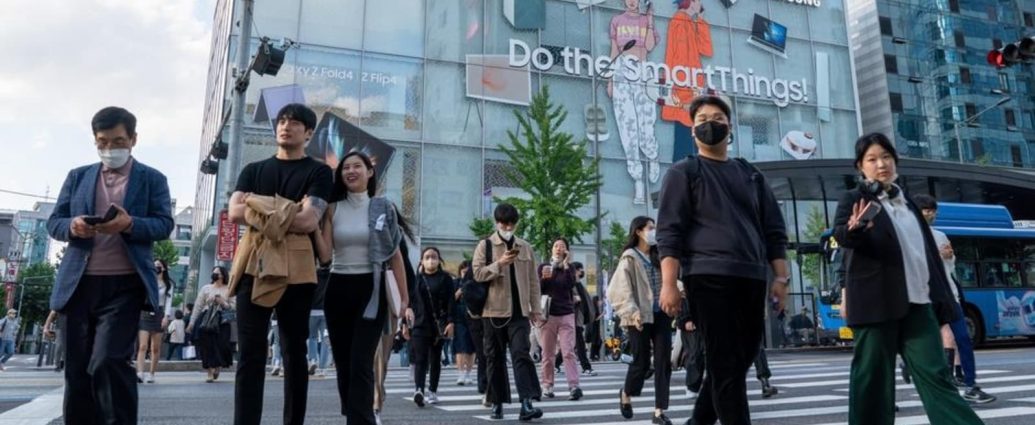In South Korea, people are more conscious than most when it comes to age. It’s hard not to be, given that there are three different ways to count it. According to the traditional Korean system, South Koreans are considered one year old at birth and they collectively turn one year older on New Year’s Day, regardless of when their birthday is.
For most legal and administrative purposes, South Koreans have used the international age system since 1962. But when it comes to the legal age for drinking, smoking, or serving in the military, they use the “calendar year” system, which subtracts the birth year from the current year.
The use of various systems can create conditions that are ripe for confusion, most recently during the coronavirus pandemic, when eligibility for vaccinations lacked clarity. (Also Read | All South Koreans to become younger as traditional age system scrapped)
But authorities hope those clouds of uncertainty will clear in June 2023, when the country will begin using the international age system alone on official documents.
Many support the change, rejoicing at suddenly becoming a year or two younger while others have greeted the news with a sigh of relief. “The Korean age system is convoluted and confusing, even for a native Korean,” Sophie Choi, a South Korean, told DW.
For many, age may be just a number, but it is not a matter that is taken lightly in South Korea.
How old are you?
“‘What year were you born?’ is a typical conversation starter when we first meet someone,” Choi said, noting that age can define people’s interactions.
This age-based relationship starts early, on the playground, according to Pympon Park, a Thai mother married into a Korean family in Seoul.
“I once told my daughter to go play with her ‘friend’ but my mother-in-law corrected me, saying that child is actually her senior,” she said.
An age difference of just one year, or less, is meaningful in South Korea. “Even twins set out who is older and who is younger,” Jieun Kiaer, a professor of Korean linguistics at the University of Oxford, told DW.
Social relations based on age in modern-day Korea are a legacy of Confucian teachings that emphasize respect for one’s elders.
Younger people are expected to show respect to those who are older, according to Robert Fouser, a former professor at Seoul National University.
Language reflects hierarchical structures
Age also determines how polite Koreans need be in their speech and actions.
“You cannot even say ‘it’s raining’ in a neutral way,” said Kiaer, explaining that every sentence in Korean shows “whether you believe you are of higher, lower, or equal rank. “
There are two main speech styles in Korean: banmal, the casual form typically used with family, close friends, and someone younger; and jondaemal, the respectful way of speaking used with strangers, colleagues, and someone older.
To complicate matters further, shifting between the two forms with the same person is not uncommon.
Children might use banmal with their parents in private, “but if a neighbor were to visit, they would talk to their parents politely,” said Kiaer, who explores the topic in her upcoming book, “The Language of Hallyu: More than Polite.”
Understanding the hierarchical system
While age usually determines how one person addresses another in South Korea, there are other factors to take into account as well, such as gender, socio-economic status and workplace seniority.
“Many Korean diaspora and immigrants to Korea find it very difficult to integrate into Korean society because they are not able to navigate the hierarchical system,” said Kiaer.
Assessing and reassessing the relationship between two people happens constantly, she added, and their linguistic choices might change according to the balance of power and solidarity between them.
For Park, finding the right speech style is a delicate matter that needs to be handled with a lot of care to avoid causing offense.
“You always second guess yourself, so to avoid the hassle I only use casual language with my husband,” said the 32-year-old.
Shifting to casual talk
Informally addressing someone older without first asking permission can lead to trouble. Lee, a Seoul resident, compared strangers addressing him casually to being sworn at.
“It’s insulting. When that happens, and it did a few times, I need to fight back,” the 45-year-old told DW.
According to Kiaer, it is “extremely important” to show proper respect to elders in South Korea and “conflict or even violence” can ensue when they aren’t addressed politely.
Service industry workers, in particular, are often on the receiving end of banmal-related issues, with altercations between young people working in the sector and men in their 60s and 70s frequently making the news.
“Older men in Korea are so concerned with receiving the right respect that they have even committed murder over the use of banmal,” Kiaer added.
Will South Korea’s rigid hierarchy change?
A January 2022 study by the South Korean polling and consultancy firm Hankook Research showed that 71% of South Koreans endorsed simplifying the age system, with some even hoping that it would help “reduce conflict and confusion in the culture of hierarchy based on age.”
Even so, most doubt that scrapping the Korean age will have an impact on the “strictly settled” culture of hierarchy.
“People will continue to establish hierarchy as they always have regardless of which age system they use,” Fouser observed.
Choi also believes “hierarchy is here to stay in South Korea” and nothing short of “a complete cultural reform” will fix the system.
While a change is unlikely, Kiaer sees the move as “a step in the right direction” since it shows the country “is thinking about what elements of Korean history are lingering in its present.”
“The issues caused by speech styles in Korea are so severe that we cannot sit around and wait for language and society to evolve over time,” the linguist said.
